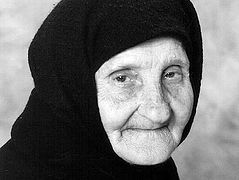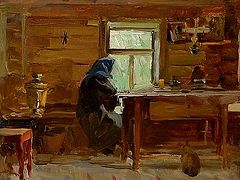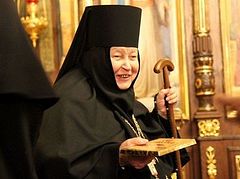“Do you know Elder Paisios the Athonite? We are the same age! I’m even slightly older: he was born in summer [July 25, 1924.—Trans.], while I was born at the beginning of the year—in February.” Indeed Nun Ekaterina (Catherine) and St. Paisios were born in the same year, 1924. Now she is ninety-six, but if we count her age from her monastic tonsure (she was tonsured in 2019), she is only one year old. The nun is full of spiritual liveliness, joy and gratitude to God, and is ready to tell everybody what happiness is.
All people want to be happy. Everything in the world happens for this purpose. Even wars and revolutions take place because people struggle for happiness. But has any revolution ever made anyone happy? No. What then? Maybe happiness doesn’t exist? No, it exists.
“What is happiness? I know what it is. I had a lot of happiness throughout my life. You know, I was born very long ago—in 1924, exactly two weeks after Lenin’s death,” Nun Ekaterina related.
Her life story is simple and amazing at the same time, as is the story of any soul that has found God after many years without Him.
Everything happens for a reason
Despite her age, Nun Ekaterina has very clear and detailed memories of the distant 1920s, her family and childhood. Her father came from a family of tailors and her mother took care of the household. In 1923 her parents moved to Ekaterinburg.
“It was there that I was born: in Ekaterinburg and not Sverdlovsk,” Nun Ekaterina showed her birth certificate faded by time with the barely legible, though discernible, word “Ekaterinburg”.
 With a sister in her childhood. But the newly-born Galina (Nun Ekaterina’s secular name) wasn’t destined to live in Ekaterinburg long. When she was several months old, the authorities decided to rename the city. Very different names were proposed, among them Krasnouralsk, Krasny Ural and even Revancheburg (an allusion to the execution of the Royal Family there). Eventually, in November 1924, Ekaterinburg was officially renamed Sverdlovsk. Thus the city lost not only its original name but also almost all of its churches. In the 1920s the Novo-Tikhvin Convent, the Ascension Church, and the “Maly Zlatoust” (“Little Chrysostom”) Church were closed. In 1930 alone The Theophany and St. Catherine Cathedrals, along with the “Bolshoy Zlatoust” (“Big Chrysostom”) Church were demolished, and the Churches of the Holy Trinity and the Dormition were closed. The new authorities tried their best to erase the memory of God from the consciousness of Soviet people.
With a sister in her childhood. But the newly-born Galina (Nun Ekaterina’s secular name) wasn’t destined to live in Ekaterinburg long. When she was several months old, the authorities decided to rename the city. Very different names were proposed, among them Krasnouralsk, Krasny Ural and even Revancheburg (an allusion to the execution of the Royal Family there). Eventually, in November 1924, Ekaterinburg was officially renamed Sverdlovsk. Thus the city lost not only its original name but also almost all of its churches. In the 1920s the Novo-Tikhvin Convent, the Ascension Church, and the “Maly Zlatoust” (“Little Chrysostom”) Church were closed. In 1930 alone The Theophany and St. Catherine Cathedrals, along with the “Bolshoy Zlatoust” (“Big Chrysostom”) Church were demolished, and the Churches of the Holy Trinity and the Dormition were closed. The new authorities tried their best to erase the memory of God from the consciousness of Soviet people.
“At that time people didn’t speak about the faith at all,” Mother Ekaterina recalls. “But when one day my mom and I were walking (I even remember that spot!), she suddenly uttered, ‘O Theotokos and Virgin, Rejoice!’; and then, ‘Our Father Which art in Heaven…’; and she fell silent without saying anything else…. So many years have passed, but I still remember that! Now I understand that this was not said by chance, that the Lord lit a spark then in my heart.”
A long journey to happiness
And next she had the life of a typical Soviet young woman. Galina graduated from school, then completed English courses and got a job as a teacher at the Construction College. There she met her future husband. Igor Dudin was her student. Though they were six years apart, he immediately fell in love with his teacher. But he hesitated to propose to her or reveal his feelings for a long time. First he decided to get some solid education and after a technical college he went to Leningrad to study at the Artillery College. Formerly it had been the “Page Corps” military academy, and in the 1940s some teachers who had taught under the Tsar still worked there.
Igor Dudin graduated from college as a real Russian officer: noble and with refined manners. He dreamed of returning to Sverdlovsk and marrying Galina in church. One day he saw a couple during the sacrament of marriage in a Leningrad church and was lost in admiration for them… Igor had been a church-goer since childhood; his grandmother had taught him that on entering church he should make the sign of the cross and venerate the icons.
On returning to Sverdlovsk Igor finally proposed to Galina, and she said yes. They had two daughters together.
“Everything was fine in my life. True, there were ups and downs in our life, but there were many very good and happy things. The Lord guided me my entire life,” Nun Ekaterina related. “Of course, then I didn’t understand that He was guiding me. I just swam with the tide. I liked everything and felt good everywhere… And we survived the Great Patriotic War; though it was a hard and terrible time, my memories of it are bright; we labored a lot, but that brought us joy.”
Galina’s family and friends don’t remember her ever quarrelling with anybody even once. She always loved everybody and lived in peace and harmony with all people around her. She had everything: a loving husband, nice children, and a job that she loved. What else could she need? But it turned out that her supreme happiness was yet to come.
“I always read a lot; I knew all the classics in literature and other genres too. Like many other Soviet people, I was fond of fantasy,” Nun Ekaterina related with a smile.
It is said that God seeks the path to the heart of every human being. Sometimes it happens through books and music; this was precisely what happened to Galina too. She has always admired the harmony of words in books and the harmony of sounds in her favorite melodies. Sometimes, when she heard a beautiful melody on the radio, she would call her daughters:
“Listen, how beautiful! It’s Beethoven’s Moonlight Sonata!”
The Dudins had a rich home library. The times changed too: the hungry 1940s and 1950s were followed by the stabler 1960s and 1970s, which were followed by perestroika and democracy…
At that time books and magazines about the faith appeared. Galina continued to read a lot and it was through this hobby that God one day revealed Himself to her.
“Once I was reading something about the faith, though I don’t remember what exactly it was,” Nun Ekaterina said. “And suddenly it dawned on me that God exists! [she weeps]. And I told my folks, ‘Girls, run and get baptized quickly!’”
From that time on their family began to attend the Church of St. Alexander Nevsky which had just been returned to the faithful (and soon it became the main church of the revived Novo-Tikhvin Convent). An absolutely new life began for Galina.
“Then I was still pretty young. I was only seventy.”
“How easy it is to live with Thee, O Lord!”
The years flew by. Both of Galina’s daughters became nuns. Her husband Igor was very sick in the final years of his life and in 2008 he reposed peacefully in his spiritual father’s arms. And Galina was left… No, not alone—with God.
She has never missed any church services. On Sundays and feast-days she can always be found at St. Alexander Nevsky’s Church of Novo-Tikhvin Convent, in the same place by the south side-chapel. Her conversation with God has lasted about thirty years now…
“I’ve travelled to church by taxi for five years now. All the drivers know me. When they arrive to pick me up, they ask me which feast is being celebrated on that day. And while we’re driving I tell them about the feast and educate them,” Mother Ekaterina said.
At last the time of her tonsure came. As soon as she began to consider this possibility, one of her daughters called her from the convent and asked her if she wished to become a nun.
“First they suggested the name Olga for me. But I replied, ‘May I take the name Ekaterina? I was born in Ekaterinburg and was awarded the St. Catherine Medal.’”
A film of this event, in which Metropolitan Kirill of Ekaterinburg and Verkhoturye presents the ninety-four-year-old Galina Leonidovna with the St. Catherine Medal, is still around. The woman venerated St. Catherine even before that event, but she took the medal as a sign that this saint was her heavenly patroness. That’s why she asked to be named Ekaterina in monasticism. Now she is the oldest nun of the Novo-Tikhvin convent.
When asked if she ever feels sad or lonely, she answers:
“What are you talking about? I have so many things to do: to pray, to read the Gospel and sing the Akathist hymn. And how can I be lonely if I am with God? And God is joy!”
Nun Ekaterina says things her soul knows by experience. Even before her tonsure she once called to her daughter (who lives at a convent) and asked her to make a beautiful inscription for her: “It is so easy to live with Thee, O Lord.” These words became the expression of her inner state. Isn’t it amazing? A ninety-six-year-old woman, though aged, lonely and weak, is filled with the joy young people can’t find in their souls.
Nun Ekaterina walked towards happiness her entire life. Though she knew nothing about God for many years, she accepted whatever He sent her with gratitude. She rejoiced in everything—nature, beauty, her family and friends, and any kind of work. In hard times she didn’t despair and didn’t blame anybody, instead giving love to everybody. Her soul prepared itself for the moment it would get to know God in this way.
“The Lord has given me a great deal. I’ve had plenty of joy in my life. I even have lived to see such happiness when I found the Lord, and He even vouchsafed me the monastic tonsure. Happiness is in God and in living for Him.”
“Great art Thou, O Lord… Great is Thy power, and Thy wisdom infinite. And Thee would man praise; man, but a particle of Thy creation… Thou awakes us to delight in Thy praise; for Thou madest us for Thyself, and our heart is restless until it repose in Thee1.” (Blessed Augustine of Hippo)








